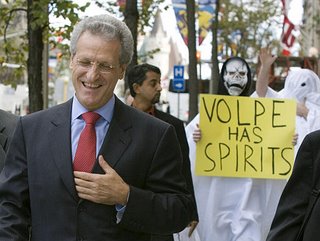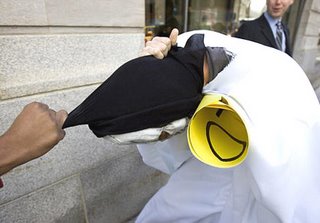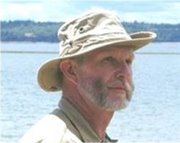Can Graham take New Brunswick from worst to first?
Can Graham take New Brunswick from worst to first?
We will take New Brunswick from WORST to FIRST in education and that means creating educational opportunity for all NB children,” said Graham.
I WON'T BELABOR the point here as I have written ad nauseum on this very topic before, in that, politicians should never make promises that they are incapable of living up to. Not only is Mr. Graham's educational policy unrealistic and flawed, it is extraordinarily difficult to pursue a strategy of "worst to first" in such an economic setting as New Brunswick without a major increase in spending or ultimately raising taxes. As well, it has already been found that throwing more money at public education will not improve test results in the province. From 1997 to 2004, New Brunswick increased its educational spending by 18 per cent only to see it matched by woeful student underachievement. According to an education expert at AIMS, "only 49 per cent of 16-year-old francophone students and 62 per cent of anglophone 16-year-olds met national expectations in science, a seven percentage point drop for English students and an 11-point decline for French students over the 1999 levels".
Moreover, I believe that rather than following the 95 recommendations made by the Mackay report on education to increase spending at all levels in hopes of unrealistically propelling the fledgling system straight up the ladder to first, New Brunswick must rework its educational system, in that, it can become more accountable for the investments that have already been made. Not to mention, we must support a system that would organize our school financing so as to empower parents and students with the ability to choose schools. A system that has been very successful in Alberta where, in turn, they have one of the most efficient and successful school systems in North America.
With the educational approach that NB Premier-designate Shawn Graham is about to embark on, I don't anticipate that Albertans have anything to worry about anytime soon, especially given the fact their student's test scores rank highest amongst most OECD countries in math, reading and science. However, NBers need clear and committed leadership on education. We do not need a leader who overpromises and plays politics with our children's futures, on the contrary, we need a leader who recognizes how difficult it will be to put this egg back together. Unfortunately, I don't believe Graham to be that man. Let's hope he can prove me wrong and make New Brunswick #1 in education in Canada.
In the meantime, check out this week's article from the Economist below on Alberta's flourishing education system, an educational system that we should definitely be modeling our system after here in NB:
[Via The Economist]
Many educators acknowledge that over the past 30 years Alberta has quietly built the finest public education system in Canada. The curriculum has been revised, stressing core subjects (English, science, mathematics), school facilities and the training of teachers have been improved, clear achievement goals have been set and a rigorous province-wide testing programme for grades three (aged 7-8), six (10-11), nine (13-14) and twelve (16-17) has been established to ensure they are met.
It is all paying off. Alberta's students regularly outshine those from other Canadian provinces: in 2004 national tests, Alberta's 13- and 16-year-olds ranked first in mathematics and science, and third in writing. And in international tests they rank alongside the best in the world: in the OECD's 2003 PISA study, the province's 15-year-olds scored among the top four of 40 countries in mathematics, reading and science (see table above).
Elsewhere in Canada, especially British Columbia and Ontario, dissatisfaction with public-school standards is increasingly driving parents to pack their children off to private schools. Over the past decade, the proportion of students in such schools has risen by 20% in Canada as a whole, and double that in Ontario. But the private system does not have the same appeal in Alberta, where some 80% of parents say they are happy with the public schools.
This is especially true in the province's capital of Edmonton, which is noted for its innovative system stressing choice, accountability and competition. Funding there is based on the number of students in a school. Each school controls its own budget, spending money on its own educational priorities (such as improving aboriginal-student results), while following the provincial curriculum. Students are free to (and 57% do) attend any school in the city, not just in their own neighbourhood. They can seek out schools specialising in the arts, sports, leadership skills, girls-only education, aboriginal culture, Mandarin, and many other alternative programmes—or simply choose the schools with the best academic results. Students in every grade are tested annually and their scores published.
The results are also used to improve teaching. There is currently a citywide push to ensure that all children in Edmonton can read competently by grade three (88% now can). Far from fearing private-school competition, the city's public system has embraced it: it has already absorbed three private religious schools (two Christian, one Hebrew). “In Edmonton,” says Angus McBeath, the city's recently retired schools chief, “the litmus test is that the rich send their kids to the public schools, not the private schools.”
Another litmus test is the extent to which Edmonton's ideas are being studied by educators from elsewhere (mostly the United States, but some also from Ontario and British Columbia) and are now being emulated. Pilot projects on the Edmonton model have already been launched by school boards in Colorado Springs, Oakland and New York City.
All this is not to say that they have all the answers in Alberta. Their rigorous measurement scheme has revealed that schools still need to do a lot better teaching aboriginal and immigrant children and ensuring that more students finish high school. At present, about 30% of students drop out early, compared with 25% for the country as a whole. That, Alberta's educators admit, is an embarrassing statistic. But in the province's red-hot economy, a 17-year-old with a driver's licence can drop out and easily make C$60,000 ($53,300) a year driving a lorry serving an oil-drilling camp. That's tough competition.
-Scott







